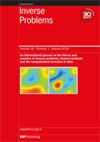Solving, tracking and stopping streaming linear inverse problems
IF 2
2区 数学
Q1 MATHEMATICS, APPLIED
引用次数: 0
Abstract
In large-scale applications including medical imaging, collocation differential equation solvers, and estimation with differential privacy, the underlying linear inverse problem can be reformulated as a streaming problem. In theory, the streaming problem can be effectively solved using memory-efficient, exponentially-converging streaming solvers. In special cases when the underlying linear inverse problem is finite-dimensional, streaming solvers can periodically evaluate the residual norm at a substantial computational cost. When the underlying system is infinite dimensional, streaming solver can only access noisy estimates of the residual. While such noisy estimates are computationally efficient, they are useful only when their accuracy is known. In this work, we rigorously develop a general family of computationally-practical residual estimators and their uncertainty sets for streaming solvers, and we demonstrate the accuracy of our methods on a number of large-scale linear problems. Thus, we further enable the practical use of streaming solvers for important classes of linear inverse problems.解决、跟踪和停止流线性逆问题
在大规模应用中,包括医学成像、配位微分方程求解器和带有微分隐私的估算,基本的线性逆问题可以重新表述为流问题。从理论上讲,使用内存效率高、指数级收敛的流求解器可以有效地求解流问题。在底层线性逆问题是有限维的特殊情况下,流求解器可以定期评估残差规范,但计算成本很高。当底层系统为无限维时,流式求解器只能获取残差的噪声估计值。虽然这种噪声估计值的计算效率很高,但只有当它们的精度已知时才有用。在这项工作中,我们为流式求解器严格开发了一系列计算上实用的残差估计值及其不确定性集,并在一些大规模线性问题上证明了我们方法的准确性。因此,我们进一步推动了流求解器在重要线性逆问题类别中的实际应用。
本文章由计算机程序翻译,如有差异,请以英文原文为准。
求助全文
约1分钟内获得全文
求助全文
来源期刊

Inverse Problems
数学-物理:数学物理
CiteScore
4.40
自引率
14.30%
发文量
115
审稿时长
2.3 months
期刊介绍:
An interdisciplinary journal combining mathematical and experimental papers on inverse problems with theoretical, numerical and practical approaches to their solution.
As well as applied mathematicians, physical scientists and engineers, the readership includes those working in geophysics, radar, optics, biology, acoustics, communication theory, signal processing and imaging, among others.
The emphasis is on publishing original contributions to methods of solving mathematical, physical and applied problems. To be publishable in this journal, papers must meet the highest standards of scientific quality, contain significant and original new science and should present substantial advancement in the field. Due to the broad scope of the journal, we require that authors provide sufficient introductory material to appeal to the wide readership and that articles which are not explicitly applied include a discussion of possible applications.
 求助内容:
求助内容: 应助结果提醒方式:
应助结果提醒方式:


